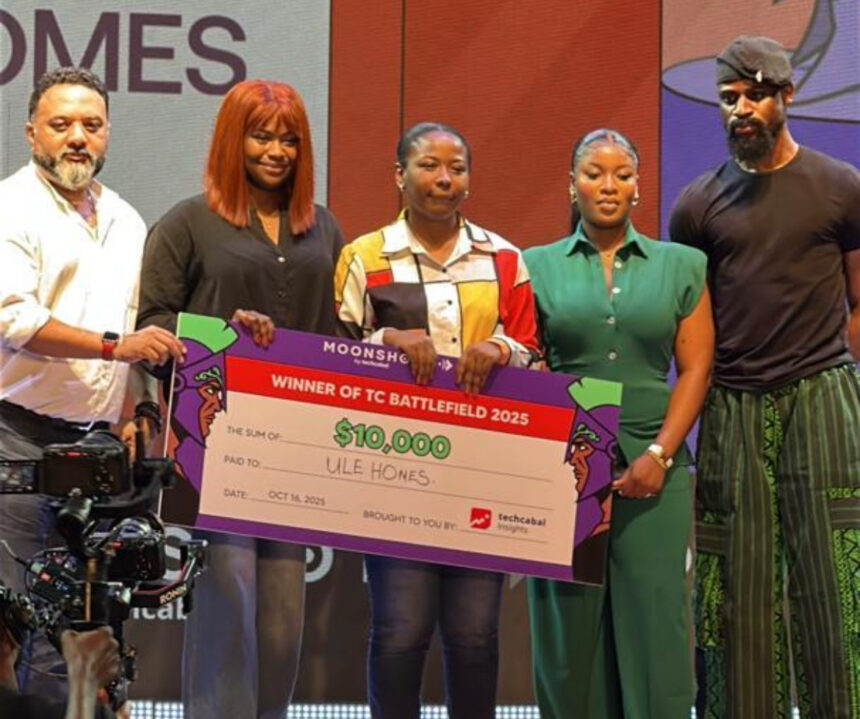Ule Homes, a Lagos-based property technology startup, has been crowned the overall winner of the TC Startup Battlefield at Moonshot 2025, earning a $10,000 grant for its innovative real estate platform.
The event, powered by TechCabal’s Moonshot and supported by global venture firm Antler, brought together Africa’s most promising early-stage ventures across various industries.
The competition’s finale was fiercely contested, reflecting the continent’s fast-growing innovation ecosystem.
Ule Homes’ solution, which simplifies the process of buying, financing, and managing homes, stood out for its potential to transform Nigeria’s real estate landscape.
Accepting the award, co-founder Omolade Akinwumi expressed her gratitude and optimism:
“I’m very excited right now. I thank you for really seeing the work that we do,” she said, capturing the enthusiasm of a startup determined to make home ownership accessible to millions of Nigerians.
Simplifying Real Estate Through Digital Innovation
The winner, Ule Homes is a Nigerian fintech and proptech startup co-founded in 2024, by Omolade Akinwumi.
Ule Homes’ core mission is to democratize access to housing in a country where the dream of home ownership remains out of reach for many.
Through its user-friendly digital platform, the company allows users to search for verified properties, access mortgage or financing options, and manage purchases securely without dealing with the traditional barriers of paperwork, middlemen, or opaque pricing.
By connecting buyers with trusted developers and financial institutions, Ule Homes bridges the gap between aspiration and affordability.
Its approach not only simplifies real estate transactions but also brings transparency to a market often characterized by fraud and inefficiency.
For many Nigerians, especially young professionals and the diaspora seeking investment opportunities back home, the startup’s model offers a credible, tech-driven path to home ownership.
How Technology is Reshaping Home Ownership
The success of Ule Homes mirrors a broader transformation within Africa’s property and financial technology sectors.
By leveraging data analytics, AI-assisted valuation tools, and digital financing channels, the company is helping Nigerians make informed real estate decisions with greater speed and safety.
Nigeria’s housing deficit, estimated at over 28 million units, continues to widen amid rapid urbanization and rising property costs.
However, Ule Homes’ platform demonstrates how technology can close this gap by connecting demand with supply in real time, integrating payment systems, and reducing manual processing delays.
In essence, Ule Homes’ solution positions technology not just as an enabler but as a catalyst for housing equity and financial inclusion. Proptech, or property technology, is now one of Africa’s fastest-growing tech frontiers.
With platforms like Ule Homes, tech entrepreneurs are redefining how individuals access, finance, and sustain home ownership, offering a model that could be replicated in other African cities facing similar urban housing challenges.
Startup Battlefield 2025: A Launchpad for Africa’s Boldest Innovators
The TC Startup Battlefield at Moonshot 2025 was more than just a pitch contest, it served as a continental stage for innovation and investment.
Organized by TechCabal’s Moonshot and backed by Antler, the event attracted hundreds of applicants from across Africa, with only 30 startups making it to the final showcase.
Each startup presented solutions tackling pressing challenges across sectors such as finance, health, sustainability, and infrastructure.
According to Atmaramani of Antler, the firm’s participation was not only to support the event but also to identify founders ready for investment and mentorship.
“We’re looking for high-performance individuals with deep domain expertise and a hunger to solve real problems,” he said, announcing that Antler would extend investment offers to other three startups among the top finalists.
Other Honored Participants
While Ule Homes claimed the top prize, several other ventures also captured attention for their groundbreaking ideas.
Emoti, which took home $5,000 as first runner-up, focuses on developing emotional AI systems that improve digital user experiences and promote mental well-being.
By teaching machines to understand human emotions, Emoti aims to make digital interactions more empathetic and responsive, a frontier innovation in the mental health and AI industries.
Two startups; Scrap Nigeria and ResqX, shared $4,000 as joint second runners-up. Scrap Nigeria is tackling Nigeria’s mounting waste management challenge through digital recycling systems that incentivize households and businesses to recycle more effectively.
ResqX, on the other hand, is developing emergency response technology to ensure faster interventions in accidents and natural disasters, where seconds can make the difference between life and death.
Together, these winning startups represent the diverse problem-solving spirit defining Africa’s new generation of entrepreneurs, from clean energy to healthtech, proptech, and emerging AI opportunities and challenges.
Africa’s Startup Ecosystem on the Rise
Africa’s startup ecosystem has seen rapid expansion over the past five years. In 2024 alone, African startups raised over $3.5 billion in venture capital funding, according to data from Africa: The Big Deal.
Nigeria, alongside Kenya, South Africa, and Egypt, continues to dominate the funding landscape, attracting nearly 30% of total startup investment on the continent.
Events like Moonshot, Startup Battlefield, and Nigerian Diasporal Investment Summit among others play a crucial role in sustaining this growth by providing early-stage founders with visibility, mentorship, and access to investors.
For startups like Ule Homes, such platforms not only offer funding but also credibility and partnerships that can help scale operations across Africa’s rapidly digitizing economies.
As communication expert Ridwan Adelaja rightly puts:
“I’m afraid that Africa will be reduced to people using AI, instead of people building AI products,” stressing reasons why African entrepreneurs and tech innovators must keep taking vanguard spots on the global tech race and breakthroughs.
The growing interest of global venture firms like Antler underscores an important shift, Africa is no longer viewed as a market of potential but as a living laboratory for innovation, where tech-enabled solutions are designed to tackle real human and infrastructural challenges.
The Broader Implication of Ule Homes’ Win
For Ule Homes, the $10,000 grant marks the beginning of a larger mission, to redefine how Nigerians and, eventually, Africans experience home ownership.
The win validates years of effort to merge real estate and technology into a solution that works for both buyers and institutions. It also symbolizes a broader trend: African startups are no longer just catching up with global innovation; they are shaping it.
As Omolade Akinwumi and her team continue to refine their digital platform, their story highlights how locally built technology can solve deeply rooted challenges in critical sectors like housing.
Ule Homes’ triumph at Moonshot 2025 reinforces one clear message, Africa’s innovation future is here, and it is being built by entrepreneurs who understand the continent’s problems and are bold enough to solve them.
________________________
Bookmark Techparley.com for the most insightful technology news from the African continent.
Follow us on X/Twitter @Techparleynews, on Facebook at Techparley Africa, on LinkedIn at Techparley Africa, or on Instagram at Techparleynews






